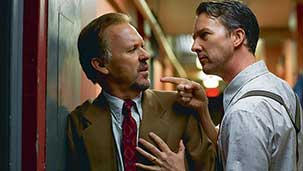Dear Fellow Critics,
Watching Birdman (or The Unexpected Virtue of Ignorance) is like watching a sparrow navigate the interior of a building. It is an agitating, beautiful, visceral experience. There is a tension inherent to something that lives one wrong choice away from utter disaster every second of its 119 minutes of life.
Alejandro González Iñárritu’s fifth feature film is a construction overrun with masculine virtues. Brash and loud, egoistic, childish in its impetuousness, and more ambitious than it is prudent, you careen along its narrow corridors, barely allowed a moment to breathe.
It is a film that lives or dies on its technical virtuosity, brilliant performances, and its foundation is a narrative that allows for multiple, but equally viable, interpretations.
That it works on any level is as much luck as intention. And that is the wonder of it. To see that kind of ambitious overreach, to see a whole company of players risk a kind of Death To Smoochy II (I’m talking specifically to Ed Norton here) and come out the other side is a rarity—especially these days.
We are living in a time where risk-averse bean counters have become cultural gatekeepers. So we often end up with the movie equivalent of pyramid building—overwrought structures that have no discernible value other than to make people crane their necks. But people will pay and pay and pay to stare at a monument to nothing simply because we are so easily amused.
This kind of filmmaking—the Christopher Nolan-Joss Whedon-Michael Bay School, for lack of a better label—is a specific peeve of Iñárritu’s and something that both he and his characters hyperbolically reject as “cultural genocide”.
Yet this film is anything but a scold, despite the amount of time and dialogue the characters spend trying to justify their art or condemn those that don’t understand it. There is a wonderful scene where Keaton’s character, Riggan Thomson, and the platonic ideal of a theatre critic, played by Lindsay Duncan, engage in a bar. Keaton gets up a head of steam and what follows is an eloquent, beautifully constructed monologue about the absolute ballsiness of getting on a stage and risking that most precious and fragile of human appendages, the ego. This is quickly followed by a terse description of how critics could well be the lowest form of life to ever crawl from the ooze. It is a beautiful, almost transcendent moment.
It is here that Duncan (an actress that should get at least half of the roles that Meryl Streep ends up in) skewers both Riggan and his pretensions with one brief observation about the vast distance between his ambitions and his reality. This is the true beauty of the work; it continually expresses the paradox of how the whole is greater than the sum of its parts. How a facile, spiritually bereft man-child can somehow create a moment of beauty, an instant of real honesty, even as he continues to destroy himself and every significant relationship he has ever had. The fact that the apex of Riggan’s creative life, both critically and as an artist, is largely the result of a single, darkly pitched failure simply underlines that truth.
There are some obvious parallels to the lives of the principals involved and that is also more a truth than it is simply a narrative construction. Keaton and Norton’s career arcs are nothing new. The sell out and the unmanageable but god-touched enfant terrible are well-worn archetypes but they exist as templates because they are so accurate to life. Iñárritu himself has been accused of flagrant pretensions and as a purveyor of “the theatre of the miserable”—accusations which he seems to accept and acknowledge as true. But he makes a strong case that those very negative attributes are as essential to the creative process as discipline, or talent, or even inspiration. Birdman (or The Unexpected Virtue of Ignorance) is the concrete example of that thesis.
Everything about it, from the faux continuous shot, to the merging of the surreal and hyperreal, even the expansive and talky script demarcate an ego that truly believes it has something useful to say to the world.
Iñárritu requires a level of engagement that few directors dare ask of an audience. Because it is set in a world of magic realist physics its value is mediated by your ability and willingness to engage with its themes. The piece requires your active participation to function properly. And to add to Iñárritu’s presumption, the last five minutes of this film is essentially a cinematic Rorschach test—what you make of it says far more about you than anything else.
Iñárritu risks everything on his ability to draw you into this confusing, fragmented world and make you care enough about characters that are flawed in the most banal ways. Neither monsters nor saints, every character (with the serene exception of Amy Ryan as Riggan’s ex) is barely hanging on by their fingernails in a narrative that manages to speak to something larger than any one person’s sad little story. Instead of providing a cathartic dénouement, Iñárritu offers you something that is either profoundly tragic, starkly redemptive, or simply an end. It all depends on you.
For that and many other reasons: the score, the astonishing cinematography, even the bleak laughter it sometimes elicits, Birdman (or The Unexpected Virtue of Ignorance) should claim the title of best film of 2014.
Sincerely,

Tim




